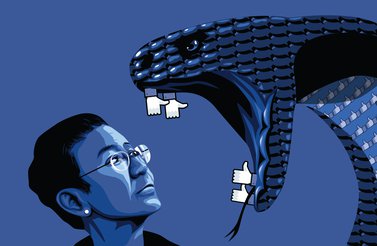Winners Take All: The Elite Charade of Changing the World, a book authored by former New York Times columnist and frequent media commenter Anand Giridharadas, is perfectly suited for the political moment. Its message fits neatly with both the progressive populist politics that have swept the Democratic primaries, and the anti-elite grievances that fuel much of the support for US President Donald Trump — quite the feat.
Giridharadas's core argument is that the practice of social entrepreneurship and philanthropy is designed to entrench the interests of the status quo. Philanthropy doesn’t solve the problems of marginalized populations or save an endangered species (although these programs, he admits, do have positive outcomes). Instead, he argues, philanthropy entrenches the power structures that caused these problems in the first place. To Giridharadas, it is not just the giving of the one percent that is rotten, but the capitalist system itself.
For example, a charter school could be funded by a billionaire’s philanthropic efforts. The students do, indeed, get an education, but that same billionaire likely avoided tax payments that would have contributed to a stronger public education system. And with a stronger public system, the private school wouldn’t have needed to exist at all. This is the structural problem that Winner Takes All details: the replacement of collective governance with a system that relies on (and bolsters) the powerful.
I don’t wholly agree with his argument. I think he focuses too much on his entry point of philanthropy in what is ultimately a broader analysis of under-regulated capitalism. This is a book about the decline of the social welfare state, made more palatable through an eat-the-rich frame.
But two aspects of this structural critique resonated with me.
The first is that technology is at the root of our crisis in inequality. This is, in part, a function of tech companies’ size and scale. In many ways, big tech is a repeat of previous monopolistic eras. If Giridharadas’s book was written 80 years ago, it would have been about the industrialist. The billionaires running big tech are the modern-day equivalent.
But there is another layer to Giridharadas’s critique of tech. It is not just tech companies’ market cap or business models that are problematic; rather, it’s that the ideas that underpin Silicon Valley are having an instrumental effect on democracy itself. Over time, the tech world’s free market zeal and ideology of individualism — combined with its assumption of positive outcomes of tech and social good — have absorbed the language of social democracy. In this world view, Silicon Valley’s technologies and its potential for philanthropy are seen as universal goods. Billionaires at the helm of big tech have built a parallel model to the welfare state — which they write off as antiquated, inefficient, cumbersome and in need of disruption.
The challenge, of course, is that unlike social innovation, social entrepreneurialism or market-driven social goods, social democracy is, at its core, accountable. The actions of the state are bound by regulations and laws that are determined and sanctioned by the consent of the governed.
Governments are fundamentally different from private companies. They can’t be disrupted and they don’t go away. They are, by definition, collective, and in practice they aim to serve the interests of society as a whole. When a tech tycoon wants to run a social initiative or a charity the same way they run their business — with the intent of disrupting an industry — then they threaten the very model of stable representative government that has, for a century, been building the social welfare state.
For Giridharadas, the problem this presents is zero-sum. Do we want to support and assist the nation-state in providing better for citizens, or do we want to enable and encourage the whims of tech billionaires? As Giridharadas states, “I actually think the government would be able to do a lot of what it does in the absence of people like Mark Zuckerberg. But I do not think Mark Zuckerberg would be able to do anything in the absence of the United States federal government.”
A second broader structural argument that Giridharadas makes is about the production of knowledge itself. He uses political scientist Daniel W. Drezner’s helpful framing for how to understand the current era of self-promotion and selling of ideas. In his book The Ideas Industry, Drezner distinguishes between public intellectuals (genuine critics of power; those who seek to engage with publics grounded in deep expertise) and thought leaders (purveyors of single big ideas that support the world views of the establishment; friends of power).
As Giridharadas describes them, “thought leaders give TED talks that leave little space for criticism or rebuttal and emphasize hopeful solutions over systemic change. Public intellectuals pose a genuine threat to winners; thought leaders promote the winners’ values, talking up disruption, self-empowerment and entrepreneurial ability.”
It is the commodification of thought leadership — book contracts, paid speaking gigs and access to power — that has arguably shaped the type of public scholarship we currently gravitate toward. These are not formal pressures, but subtle incentives that too often drive what scholars say and do in public and, in worst cases, can structure the very research that gets done.
This tension is real, and I see it play out around me all the time. I feel the incentives described by Drezner, and overall agree with Giridharadas that these pressures are having a structural impact on the quality of our public discourse. And that, perhaps worse, these pressures could be entrenching the very social, economic and technological problems many scholars are working to overcome.
But I was left wondering where Winners Take All falls in the continuum between thought leadership and public intellectual discourse. Anand Giridharadas has a big idea — an idea that resonates with a broad public, is grounded in a core truth and has provoked a barrage of media attention. But it is also an idea that demands radical structural response and fundamentally challenges the powerful. It takes on the powerful. It critiques the structure. It is, in this sense, both thought leadership and the act of a public intellectual. This is both the promise and the limitation of Giridharadas’s book. It takes a sweeping view of our current capitalist model, and uses a powerful, but ultimately narrow, frame to critique it.
What this book needs is a politics. It needs to reconcile the stories of an aristocracy run amok with an alternative philosophical frame and a political movement to enact it. It needs a politics that reinvigorates, and possibly even reimagines, social democracy for the twenty-first century. That is too much to ask of a thought leader, but it is the work of a public intellectual. And it might be the work that is needed if this political moment in the United States were to carry Bernie Sanders to the White House in 2020, or (perhaps more likely) Alexandria Ocasio-Cortez in 2024.




